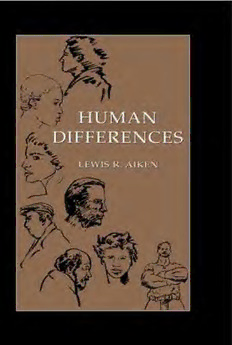Table Of ContentHuman Differences
This page intentionally left blank
Human Differences
Lewis R. Aiken
Pepperdine University
vp Psychology Press
Taylor & Francis Group
New York London
First Published by
Lawrcncc Erlbaum Associates, Inc., Publishers
10 Industrial Avenue
Mahwah, NJ 07430
Transferred to Digital Printing 2009 by Psychology Press
270 Madison Ave, New York NY 10016
27 Church Road* Hove, East Sussex, BN3 2FA
Copyright © 1999 by Lawrcncc F.rlbaum Associates, Inc
All rights reserved. No part of this book may be reproduced
in any form, by photostat, microfilm, retrieval system, or
any other means, without prior written permission of the
publisher.
Cover design by Kathryn Moughtaling Lacey
Library of Congress Cataloging-in-Publication Data
Aiken, Lewis R., 1931-
Human differences / Lewis R Aiken,
p. cm
Includes bibliographical references and index
ISBN 0-8058-3091*X (hardcover : alk paper) — ISBN
0-8058-3092-8 (pbk : alk. paper)
1. Individual differences I. Title.
BF697 A55 1999
155 2 2—dc21 99-11092
CIP
ISBN 978-1-135-67454-0
Publisher's Note
The publisher has gone to great lengths to ensure the quality of this reprint
but points out that some imperfections in the original may be apparent.
Not ev’ryone’s the same as some,
For folks are good and bad.
And once in a while you’ll see a smile
On someone who is sad.
‘Cause people are alike and not;
They are both right and wrong.
And if you come near, you may sec fear
In someone who is strong.
To you I may look mean as sin.
But gaze at me anew,
And then you may see that old mean me
Is as kind as that old mean you.
So let’s forgive the us we don’t
And like the us we do,
Then time will soon tell if all goes well
With the not us and me and you!
— Lewis R. Aiken
This page intentionally left blank
Contents
Foreword ix
Preface XÌii
Origins and Developments 1
Measurement and Research Methods 16
Biological Foundations 41
Sociocultural Foundations 64
Physical Appearance, Performance, and Health 87
Theories, Concepts, and Correlates 110
of Cognitive Abilities
Exceptional and Special Cognitive Abilities 140
Personality Theories, Concepts, and Correlates 167
Personality Problems and Disorders 196
Differences Across the Life Span 222
vii
Vii! CONTENTS
Glossary 253
References 281
Author Index 317
Subject Index 333
Foreword
Research on human differences is a double-edge sword. On the one hand, a
preoccupation with the differences among people can lead to stereotyping
and provide support for prejudice and discrimination. This was the trap
into which certain early pioneers in the mental testing movement fell, a trap
set and sprung by those with an ethnocentric philosophy of life and a politi
cal agenda rationalized by eugenics. Of course, modem thinkers, whether
liberal or conservative in their social and political viewpoints, are not im
mune to ethnocentrism. This is not surprising when one considers the uni
versality of group pride, social competition, and outgroup hostility. It often
seems, as some have argued, that humans have not really grown much in
wisdom since Cro-Magnon times and each generation must rediscover tol
erance and philanthropy.
On the other hand, it can be argued that a knowledge of human diversity
is important in understanding and appreciating individuals and cultures
that are different from one’s own. In fact, a defensible point of view is that,
because heterogeneity and hybridization have greater survival value than
homogeneity and cloning, they should be encouraged and applauded
rather than dwelt upon as causes of social friction.
This book is a mixture of concepts and findings from biology, sociology,
economics, psychology, and many other natural and social sciences. But be
cause the author is a psychologist, much of the book is about psychology.
American psychology developed in the early part of the 20th century in the
context of a socioeconomic system that was based on the principle of eq
uity. According to this principle, the goods and services obtained by people
should be commensurate with their abilities and efforts. In contrast to the
principle of equity, adherence to the principle of equality results in the divi
sion of resources equally among individuals who perform many different,
but necessary, tasks. Historically, Americans have seemingly straddled the
fence between these two principles, a gymnastic exercise that might be sim
pler if all people were truly created equal.
A generation ago Leona Tyler (1978) proposed that we move away from
psychological assessment mode based on the equity principle toward one
ix

